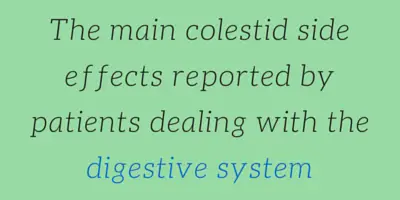
Not everyone will experience colestid side effects, but if you do, you are most likely to experience some form of digestive distress.
Doctors prescribe colestid (colestipol hydrochloride) to lower high cholesterol and fat levels in your blood.
The medication can be effective but those who experience side effects will need to decide if the benefits are worthwhile.
Colesitid is referred to as a bile acid sequestrant, it lowers cholesterol by changing the way your body handles the digestive enzyme bile.
Your body needs cholesterol to make bile acids within your liver. Bile acids are sent into your digestive tract from the liver where they work to break fats into smaller, more easily absorbed globules.
After bile completes its task, much of it is reabsorbed and returned to your liver. This process is referred to as the enterohepatic cycle.
Colestid grabs a hold of bile acids in your digestive tract and carries it out of your body in your stool, disrupting the enterohepatic cycle.
Because the bile acids, which contain cholesterol, are not reabsorbed by your body, your liver must use up available cholesterol to make new bile salts and the level of cholesterol in your blood goes down. (1)
Colestid Side Effects
The main colestid side effects reported by patients dealing with the digestive system. Most patients who complain of colestid side effects name constipation as the main issue.
List of Colestid Side Effects:
• Constipation, mild to severe
• Abdominal pain and/or cramping
• Gas
• Bloating
• Indigestion
• Heartburn
• Diarrhea
• Nausea and vomiting
Rare Colestid Side Effects and complications that have been reported include:
• Bleeding hemorrhoids
• Bloody stool
• Peptic Ulcers
• Cholecystitis (inflammation of the gallbladder)
• Cholelithiasis (gallstones)
• Difficulty swallowing
Colestid Side Effects that are not related to the digestive system include:
• Chest pain and cardiovascular symptoms such as angina and tachycardia
• Rash
• Muscle and joint aches and pains
• Headaches
• Dizziness
• Insomnia
• Weakness and fatigue
• Short of breath
• Swollen feet and hands
What You Should Do About Your Colestid Side Effects
You should never quit taking colestid or any prescription medication without first speaking with your medical doctor. By discontinuing a medication abruptly, you could cause damage to your cardiovascular health.
Tell your doctor if you have experienced gastrointestinal issues in the past, before you begin taking colestid. Your doctor may attempt to lessen digestive issues by starting you on a low dose and slowly building your dose.
Experts find that gradually increasing the dosage of colestid from a starting dose of 2 grams can minimize digestive distress, yet allow for optimal cholesterol-lowering benefits.
All prescription medications for cholesterol reduction lead to side effects and every patient responds differently to medications. If you are concerned about the side effects of taking medication for your cholesterol, you may want to consider natural alternatives for lowering your cholesterol level.
Other things that you can do is eating a heart healthy diet that is low in saturated fat and high in fiber, exercising regularly, managing your weight, and supplementing your diet with natural cholesterol lowering supplements, you can significantly improve your cholesterol profile.
Leave colestid side effects and go to Dangers of Cholesterol Drugs
Or visit our homepage of All About Lowering Cholesterol
References:
